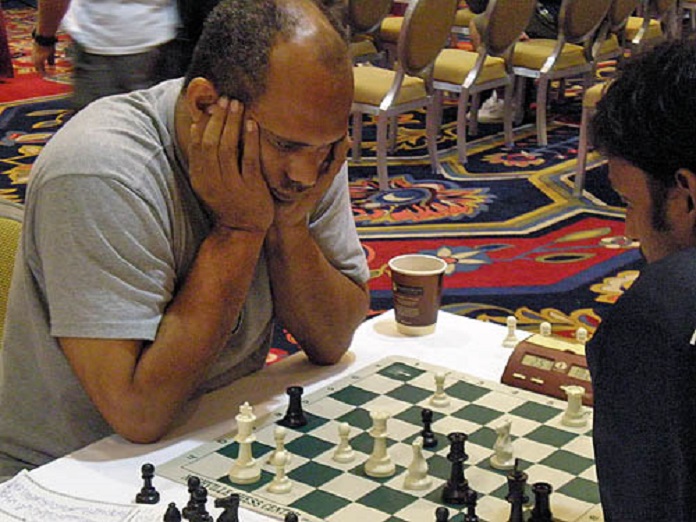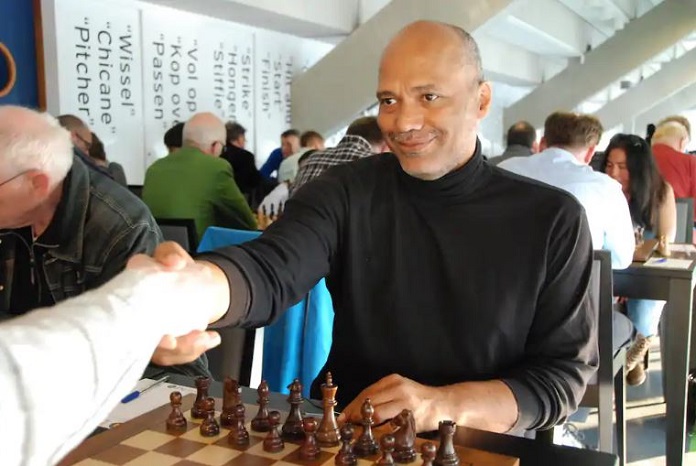Emory Tate’s net worth was estimated to be about $5 million. He was an American chess International Master renowned for his incredible skills that made him famous and wealthy.
Emory Tate is believed to have had a high intelligence quotient even though his IQ was not formally measured for the public to see. His many chess exploits were only attainable by smart people and so for many people, Tate was a truly intelligent man who could pass for a genius. Tragically, the chess master died in 2015 from a heart attack.
How Emory Tate’s Net Worth of $5 Million was Made
Without any doubt, Emory Tate was a wealthy and accomplished man who charmed many people with his ability at playing chess. His chess career fetched him a lot of money. By the time of his death, he was reported to be worth an incredible $5 million.
But how did he make all his money? Was it all from chess? Let’s take a look at how he made his money below.
He Served in The United States Air Force
Emory Tate’s first real taste of regular income came when he joined the US Air Force in the 1970s. According to reports, Tate proudly served his country as a dedicated member of the United States Air Force for several years. During his time in the Air Force, he grew through the ranks to become a staff sergeant. His earnings as a serviceman would later enable him to pursue his other dreams.
While still serving in the Air Force, Emory Tate’s innate intellectual curiosity led him to delve into the world of languages and became a linguist, eventually mastering various languages. Because he knew different languages, Enory State eventually ended up making some more money as a translator in the US Air Force.
One noteworthy milestone in Emory’s linguistic journey was his immersion in the Spanish language. This transformative experience took place when he had the privilege of being an exchange student in Mexico.

He lived with a Mexican family for two months and this time provided Emory with a deep appreciation for the intricacies of the Spanish language. Interestingly, his understanding of the Spanish language would later help him in the future as he traveled to different countries to play chess. Some reports say he also understood Russian and other languages.
Recognizing Emory Tate’s exceptional aptitude for languages, he was selected to participate in the prestigious Indiana University Honors Program in Foreign Language, specifically the Spanish Division, during the summer of 1975. This exceptional opportunity allowed him to further refine his Spanish language skills under the guidance of esteemed scholars.
Chess Was The Biggest Contributor To Emory Tate’s Net Worth
Emory Tate’s net worth of $5 million was majorly built through his journey as a chess player. Today, he is regarded as one of the most important figures in the world of chess in the USA. His impact on the world of chess is nothing short of remarkable. As a chess International Master, he blazed a trail for African-American players, leaving an indelible mark on the chess community.
According to our findings, Emory Tate’s journey began in his childhood years when he discovered the game as a child and then swiftly began to showcase his exceptional talent. His skills developed rapidly, as he consistently outplayed his peers, defeating other children in chess matches. Remarkably, even at a young age, Tate exhibited a level of skill that allowed him to challenge and triumph over adult opponents, stunning everyone and solidifying his reputation as a prodigious chess talent.
When he eventually joined the US Air Force, Emory Tate’s passion for chess persevered throughout his military service. Despite the demands of his duty, he continued to pursue his love for the game, participating in tournaments and competing against fellow servicemen. In 1984, Emory’s dedication and skill culminated in a significant victory at the 25th Annual Armed Forces Chess Championship Tournament, further establishing his prowess on the chessboard. He pocketed a large winner’s purse following his victory.
During his tenure in the Air Force, Emory Tate became a dominant force in the chess world. Reports reveal that he triumphed in the United States Armed Forces Chess Championship an astonishing five times, making him the most decorated U.S. serviceman in the history of the tournament.
His successive wins in the championship mirrored his progression through the ranks of the Air Force, with victories earned as a senior airman, sergeant, and ultimately as a staff sergeant. Fellow Air Force veteran and 2003 U.S. Armed Forces Chess Champion, Leroy Hill, spoke highly of Emory, attributing his nickname “Extraterrestrial” to his exceptional and otherworldly style of play.
Following his honorable discharge from the Air Force, Emory Tate’s dominance on the chess scene persisted. Embarking on a journey across the United States in the 1990s, he participated in open tournaments spanning the breadth of the country.
Emory’s skill and tenacity shone brightly as he emerged victorious in the Indiana State Chess Championship six times, attaining the esteemed title of Indiana State Chess Hall of Fame inductee in 2005. He further added to his impressive list of accolades by winning the Alabama State Championship in 2010. All of these winnings and their prizes went to boost Emory Tate’s net worth.

Emory Tate’s passion for chess took him far and wide, as he embraced a peripatetic lifestyle. Spending extended periods in Europe and actively participating in tournaments, he honed his skills against international opponents. Notably, his peak U.S. Chess Federation (USCF) rating reached an impressive 2508 in December 1996. While his Fédération Internationale des Échecs (FIDE) rating peaked at 2413, Emory earned the prestigious title of International Master just before his 50th birthday, having obtained his final norm at the World Open in 2006.
Renowned for his creativity and formidable tactical skills, Emory Tate earned a reputation as a dangerous adversary on the U.S. chess circuit. His audacious playing style allowed him to secure victories against approximately 80 grandmasters throughout his career, further solidifying his standing as a formidable force in the chess arena. Emory Tate’s remarkable achievements, unwavering dedication, and daring approach to the game continue to inspire chess enthusiasts around the world.
During his career as a chess player, he pocketed a lot of money from winnings at chess tournaments. The money he made from chess made up the most part of Emory Tate’s net worth.
Emory Tate was Also a Chess Instructor
In addition to his extraordinary chess-playing abilities, Emory Tate also dedicated himself to sharing his knowledge and love for the game by becoming a respected chess instructor. Not only did he excel on the chessboard, but he also possessed a natural talent for imparting his wisdom to others, particularly young aspiring chess players.
One notable instance of Emory’s teaching endeavors occurred in 1993 when he generously offered chess lessons to elementary school students in Goshen, Indiana, as part of a community school board program. Through this initiative, Emory had the opportunity to introduce the game to young minds, instilling in them the fundamental principles of chess strategy and cultivating a passion for the game that would extend beyond the classroom.
Emory’s impact as a chess instructor extended far beyond the borders of Goshen. Reports suggest that he also shared his expertise with students in various other locations throughout the United States. Whether it was through workshops, chess camps, or individual coaching sessions, Emory’s ability to connect with his students and inspire them to reach their full potential made him a revered figure in the realm of chess education.

Emory’s passion for teaching chess was not solely driven by a desire to pass on his knowledge. Teaching the game also served as a means of financial sustenance for him. He is believed to have been paid handsomely for his work as a chess tutor around different parts of the United States. This also ultimately boosted Emory Tate’s net worth. As a chess teacher, Emory Tate was widely respected, admired, and recognized for his significant contributions to the development of young chess enthusiasts.
Was Emory Tate a Grandmaster?
Emory Tate’s chess career reached extraordinary heights, yet he fell just short of achieving the coveted Grandmaster title, leaving many to wonder about the reasons behind his failure to become a chess Grandmaster. Although Emory achieved notable victories over several Grandmasters throughout his career, the title itself eluded him.
Speculations suggest that Emory’s omission from the list of Grandmasters can be attributed to a few key factors. His style of play, characterized by aggressive tactics and an unwavering attacking approach, may have hindered his ability to demonstrate the strategic patience and subtle understanding of positional play often associated with Grandmasters. Additionally, some have noted that Emory’s endgame technique may have been less refined compared to the meticulous precision exhibited by many Grandmasters.
While Emory’s tactical brilliance allowed him to triumph over numerous Grandmasters, his audacious style also resulted in occasional defeats. Nevertheless, his victories against these esteemed players numbered over 80, a testament to his remarkable skill and fearless approach to the game. Emory’s chess career was marked by a series of notable wins and losses, including a lighthearted 9-move loss to Alexander Yermolinsky, where Emory humorously allowed himself to be checkmated.
Later in life, Emory Tate is believed to have redoubled his efforts to attain the Grandmaster title. It was around the same period he took up the role of teacher that this happened. However, he never got to achieve the title. Tragically, Emory Tate’s pursuit of the Grandmaster title was cut short when he passed away while still chasing it.
It was speculated that the World Senior Championship might have presented a promising opportunity for Emory to make his mark of becoming Grandmaster, especially considering that his FIDE rating had fallen to the 2200s at the time of his passing.
It is noteworthy that although he did not attain the Grandmaster title, Emory Tate’s impact on the world of chess remains significant. Revered as one of the greatest players in the United States, his audacious and attacking style inspired countless chess enthusiasts and left an indelible mark on the game. Emory’s contributions to the field, his impressive legacy, and his remarkable victories against Grandmasters continue to resonate and inspire new generations of players.
What was Emory Tate’s IQ?
Emory Tate was clearly a very intelligent man believed to have had a high IQ. His intellect was widely recognized and admired by those who knew him, but the exact measure of his IQ remains elusive. While questions about his IQ have persisted over the years, there is no definitive public record of his IQ score, and it is not clear whether he ever underwent formal testing to ascertain it.
During his lifetime, Emory Tate’s IQ was not publicly disclosed, leaving enthusiasts and researchers to speculate about his intellectual capabilities. Some sources have suggested a potential range of IQ scores between 130 and above, indicating high intelligence. However, it is important to note that these claims remain unverified and lack substantial evidence. Despite the lack of evidence to show his IQ rate, what is clear is that Tate was very intelligent.
His strategic thinking, analytical skills, and creative approach to the game demonstrated a profound intellect that set him apart from his peers. Emory’s exceptional talent and contributions to the chess community stand as a testament to his intellectual prowess and the impact he made within the realm of chess.

How Did Emory Tate Die?
Tragically, Emory Tate passed away on October 17, 2015. What is more startling is that he died while participating in a chess tournament. He died doing what he loved. According to our findings, on that day, Emory Tate found himself engaged in a chess tournament held in Milpitas, California. Several chess masters and Grandmasters were in attendance, all taking part in the event.
During the tournament, after completing the first round of his game, Emory Tate briefly excused himself and headed to the restroom. Upon returning to his seat, he bent over and whispered to one of his fellow participants, urging them to call 911. However, before anyone could fully comprehend the gravity of the situation, Emory Tate suddenly collapsed, with his health rapidly deteriorating.
The chess tournament participants, shaken and concerned, immediately sprang into action. They frantically attempted to provide him with necessary first aid while anxiously awaiting the arrival of emergency medical services. Despite their valiant efforts to stabilize his condition, the severity of the situation was profound.
Within a ten-minute timeframe, the emergency services arrived at the scene. Hastily transporting Tate to the hospital, medical professionals tirelessly worked to resuscitate him. Tragically, their efforts proved futile, and Emory Tate was pronounced dead. At the time of his untimely passing, he was only 56 years old. Medical personnel determined that the cause of his sudden demise was a heart attack.
Emory Tate’s unexpected and tragic death sent shockwaves throughout the chess world, as players and enthusiasts mourned the loss of a revered talent. In the aftermath of his passing, numerous grandmasters and international masters composed heartfelt tributes to honor, recognizing his immense contributions to the chess community and the inspiration he provided to aspiring players.
The profound impact of Emory Tate’s life and legacy did not go unnoticed by governmental authorities either. In 2016, the Alabama Senate took a notable step, passing a resolution that celebrated Emory’s remarkable achievements and commemorated his enduring legacy. The resolution served as a testament to the profound influence he had on the chess community.
Emory Tate Ethnicity
Emory Tate was a proud African-American man. He associated very much with his people and helped many black people in his community learn chess. Tate was born on December 27, 1958, in the lively city of Chicago, Illinois, so his nationality was American, as he was born and raised in the United States.
As our research reveals, Emory spent his formative years in a bustling household surrounded by his eight siblings. Growing up in such a large family environment, he learned very early how to cope with the stress that comes with managing people and learning to interact with them every single day. This would later go a long way in influencing the way he played chess.
Within his dynamic family structure, Emory’s father, Emory Andrew Tate Sr., practiced law, while, his mother, Emma Cox Tate, showcased her business acumen by successfully managing a truck-leasing business. Emory’s parents instilled in him the values of hard work, determination, and the pursuit of excellence, laying the foundation for his future accomplishments. He would uphold these values all his life.
